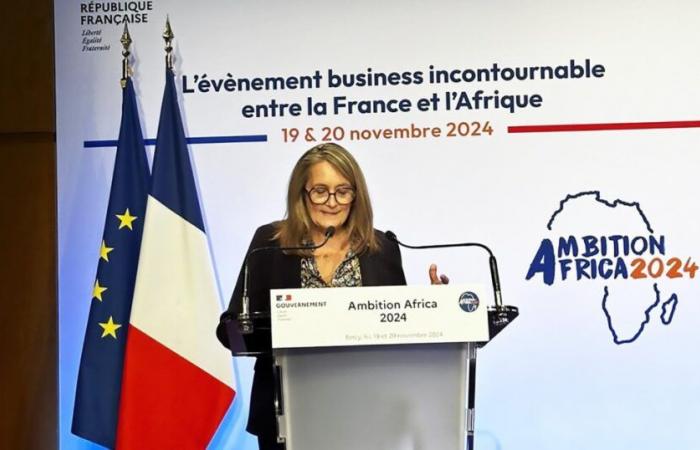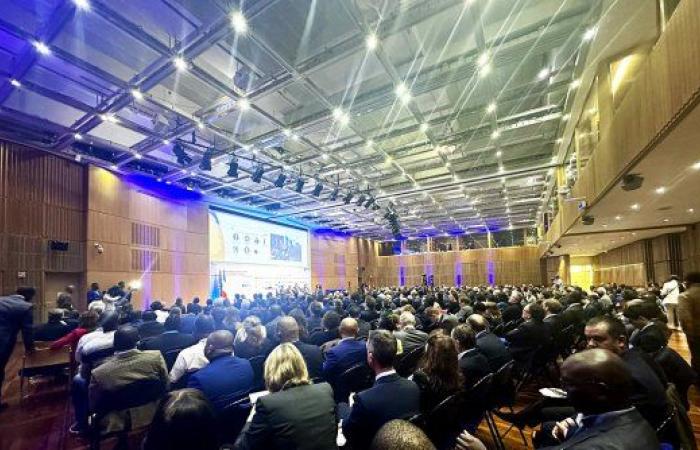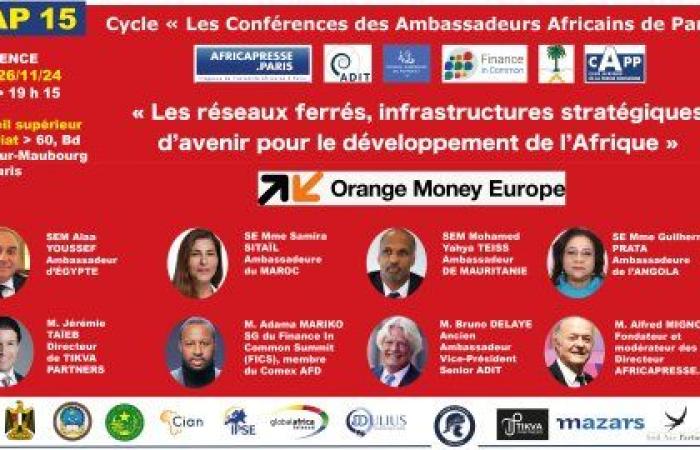Sophie PRIMAS, French Minister of Foreign Trade, during her speech at Ambition Africa 2024, in Paris-Bercy. Photo © DR
The 2024 edition of Ambition Africa was, according to its organizers, a real success for Team France Export, with more than 2,100 registered (1,800 present), including 900 African participants and 300 French participants, who exchanged on the sidelines of the 17 round tables organized over two days in Paris – Bercy (Ministry of the Economy and Finance).
.
By Denis Deschamps for AfricaPresse.Paris (APP)
@africa_presse
@DjuliusD
.
The operational managers of Business France for Africa, Michel Bauza for North Africa and Marc Cagnard for sub-Saharan Africa, thus reported the extremely satisfactory results of this VIe edition of Ambition Africa, opened on November 19 by the Export General Director of Expertise France, Didier Boulogneand by the Minister of Foreign Trade, Sophie Primas.
In a still disrupted post-covid19 context, they recalled that Africa indeed constituted a real continent of opportunity for 3,000 French companies expanding into 30 countries across the continent.
According to the minister Sophie PrimasAfrica in fact represents a set of major opportunities for France, which must, for its part, also strive to diversify its supplies through strengthened partnerships, both in the agricultural field and for industry (for example example, the automotive sector with Morocco which produces 700,000 vehicles per year, 14 kilometers from Europe, via the port of Tangier).
As the minister pointed out in her opening speech, this France-Africa partnership aimed at “designing and producing together”, must also be able to integrate the concern of fight against climate changethrough greater involvement of companies and the sharing of technologies to be able to effectively “do things together”.
Also, support for the “emergence of talents among African youth” through systems such as École 42 and the Orange Digital Centers. Sophie Primas finally recalled, before concluding, that “it is important to invest in human capital to support co-development” which will ultimately contribute to making “France attractive for African investors”.
Africa therefore constitutes a priority for French companies, with a Business France system which, as explained by Marc Cagnardcovers 7 countries in sub-Saharan Africa, with sectoral experts (for example, in the agro-technology sector, etc.) who support (individually and also as part of collective missions) 2,300 French companies per year in the implementation relationship and the conclusion of partnerships with African companies.
From left to right: the operational managers of Business France, Marc Cagnard for sub-Saharan Africa and Michel Bauza for North Africa. Photo © DR
.
In North Africa (Morocco, Algeria, Egypt, Tunisia, Libya), 700 French companies are also supported – out of a total of 1,500 established subsidiaries, including 1,000 in Morocco alone – each year by the Business France teams, which this involves participation in trade fairs or business meetings.
Also, Michel Bauza specified that Tunisian and Moroccan companies are investing in France, like other companies on the continent, which today have more than 1,400 subsidiaries in France, representing a total of 15,000 jobs. (Africa accounts for 4% of FDI – foreign direct investment – in France, including a share from South Africa).
This is why the 2024 edition of Ambition Africa will necessarily result, according to Marc Cagnard and Michel Bauza, in the conclusion of partnerships generating turnover and additional jobs; it being understood that Business France will ensure operational monitoring of approximately 2/3 of the business meetings organized during the two days of this event.
.
The biggest event
business from Business France
.
With 110 speakers and a significant number of business meetings organized as part of Ambition Africa – according to Marc Cagnard, it is “the most important Business France event in France” – many issues and challenges were addressed and discussed with the participants, including the establishment of the African Continental Free Trade Area (AfCFTA) in the 48 out of 54 countries having ratified an agreement which, according to its Secretary General, Wankele Mene, will make “Africa the most competitive continent within twenty to thirty years”…
Also, talent management through strengthening human capital in all sectors (for example, with IFAD – Work-study training institutes for development, presented by Abdul Fahd FofanaMinister of Inclusion and Youth of Togo) with the development of cultural and creative industries (the Minister of Tourism, Culture and Arts of Benin, Jean-Michel Abimbola thus praised Cotonou as being “the epicenter of the creative economy in Africa” with the development in particular of gaming and the creation of 4 museums…) and artificial intelligence, the development of infrastructures (in particular, networks of transport to avoid congestion in cities, as highlighted Thierry Déau, of MERIDIAM) and food sovereignty (with agri-food centers to support small local producers, as presented by Karim Aït Talb of GEOCOTON)…
But above all, the subject of climate change and its consequences for Africa and its vulnerable populations was treated and developed within the framework of discussions on the African economy of tomorrow, which must be able to be based on sustainable and inclusive growth. The Minister of Economy and Finance of Morocco, Nadia Fettah thus particularly insisted on the need to have a “long-term vision based on social States” which must be built thanks to educated populations and economies diversified through public-private partnership (notably in the field of energy renewable energy sources to accelerate the energy transition), while respecting major macroeconomic balances.
A view of the Ambition Africa 2024 plenary room, at Paris-Bercy. Photo © DR
.
Ecological transition
and long-term vision
.
To prevent the continent from one day paying the very high price of climate change, the ecological transition towards a low-carbon development trajectory is therefore an obligation that is all the greater given that immense potential exists in Africa, both in the field of geothermal energy as well as wind power and especially solar power.
In Djibouti, pending the installation of a 60 MW wind power plant and a decision regarding a 30 MW solar project, the population thus installs, on its own initiative, individual solar panelswhose costs have fallen enormously.
The climate is in fact one of the parameters for improving the business climate through the implementation of good practices on the African continent. Indeed, as pointed out Abdelmalek AlaouiCEO of GUEPARD GROUP (Morocco), if the question of “climate balance” is not well taken into account in an approach to co-construction of long-term partnerships between Africa and Europe, the impact of climate change on the most vulnerable populations is likely to increase significantly, with economic/climatic migration as a visible consequence.
It is therefore important for Africa to find the best investors who will enable it to develop its value chains in conjunction with local partners, to promote local skills and to support the development of businesses and projects with a positive impact on Africa. environment.
This is why, as mentioned with Cynthia Gnassingbe-Essonam (see our exclusive interview here)responsible for the private sector at the AfCFTA secretariat, this agreement currently only focused AFCFTA on trade will soon have to integrate climate considerations, within the framework of an additional protocol whose discussion is in sight and the implementation is to to expect.
.
◊ ◊ ◊ ◊ ◊ ◊ ◊
◊ ◊ ◊ ◊ ◊ ◊ ◊
.
Agenda Paris, Tuesday 11/26/24 – Nine Ambassadors will participate in the XVe CAAPdedicated to rail networks in Africa. LAST PLACES AVAILABLE…

.
◊ ◊ ◊ ◊ ◊ ◊ ◊








